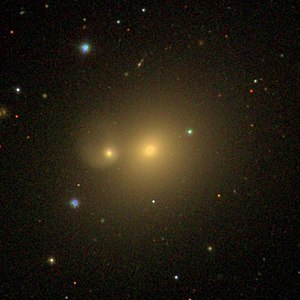NGC 2672
| Galaxy NGC 2672 |
|
|---|---|

|
|
| SDSS image of NGC 2672, companion galaxy NGC 2673 (left) | |
| AladinLite | |
| Constellation | cancer |
|
Position equinox : J2000.0 , epoch : J2000.0 |
|
| Right ascension | 08 h 49 m 21.9 s |
| declination | + 19 ° 04 ′ 30 ″ |
| Appearance | |
| Morphological type | E1-2 |
| Brightness (visual) | 11.6 mag |
| Brightness (B-band) | 12.6 mag |
| Angular expansion | 3 ′ × 2.8 ′ |
| Position angle | 117 ° |
| Surface brightness | 14.0 mag / arcmin² |
| Physical data | |
| Redshift | 0.014487 ± 0.000033 |
| Radial velocity | (4343 ± 10) km / s |
|
Stroke distance v rad / H 0 |
(190 ± 13) · 10 6 ly (58.2 ± 4.1) Mpc |
| history | |
| discovery | Wilhelm Herschel |
| Discovery date | March 14, 1784 |
| Catalog names | |
| NGC 2672 • UGC 4619 • PGC 24790 • CGCG 090-019 • MCG + 03-23-010 • 2MASX J08492189 + 1904298 • Arp 167 • GC 1704 • H II 48, H II 80 • h 526 • LDCE 0595 NED002 | |
NGC 2672 is an elliptical galaxy of Hubble type E1 in the constellation Cancer on the ecliptic . It is estimated to be 190 million light years from the Milky Way and forms the optical galaxy pair Arp 167 with NGC 2673 . Halton Arp organized his catalog of unusual galaxies into groups according to purely morphological criteria. This galaxy belongs to the class galaxies with diffuse opposing arms .
The object was discovered by Wilhelm Herschel on March 14, 1784 .
Web links
Commons : NGC 2672 - collection of images, videos, and audio files
literature
- Jeff Kanipe and Dennis Webb: The Arp Atlas of Peculiar Galaxies - A Chronicle and Observer's Guide , Richmond 2006, ISBN 978-0-943396-76-7
